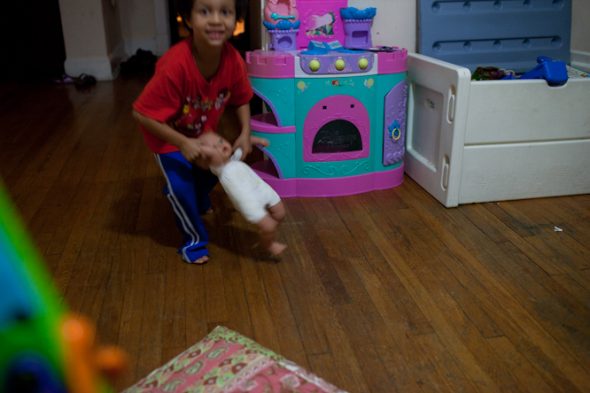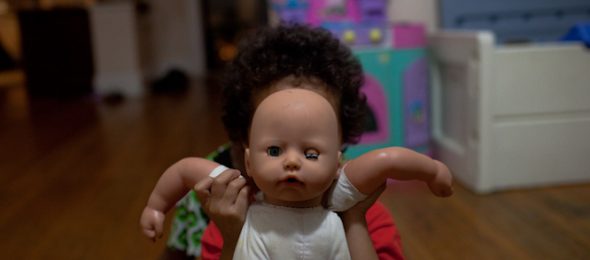
By Aman Ali
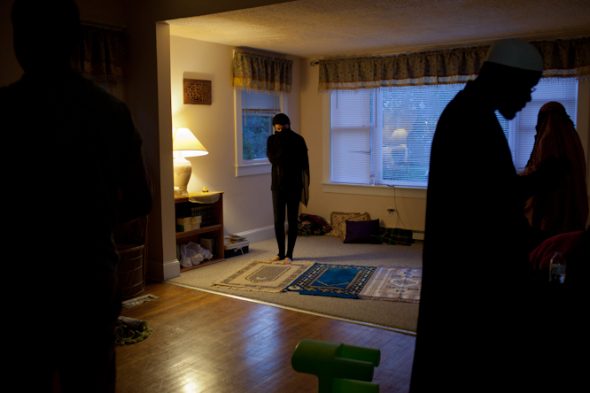
Note: To ensure the safety and privacy of these women, they put on face veils and used different names in this interview to not reveal details about their identity.
Saima came to the U.S. from Pakistan for marriage. For lack of a better phrase, she went through four years of hell.
“I was in a different country and didn’t know the language,” she said in Urdu to me. “I had no family members here to help me. He forced me to stay in a basement, I was beaten, I was tortured and I was abused. I had no way communicating with my family for help.”
Just forming the words to talk about the abuse she went through is tough for her. She repeatedly pauses and looks the other way recollecting the details of the marriage she is seeking shelter from.
She’s one of many women here at Muslimat Al-Nisaa, a domestic violence shelter for Muslim women located in the heart of Baltimore. It might be the only shelter for battered Muslim women in this country. These women’s stories are a painful reminder of why the Muslim community can no longer sweep the issue of domestic violence under the rug.
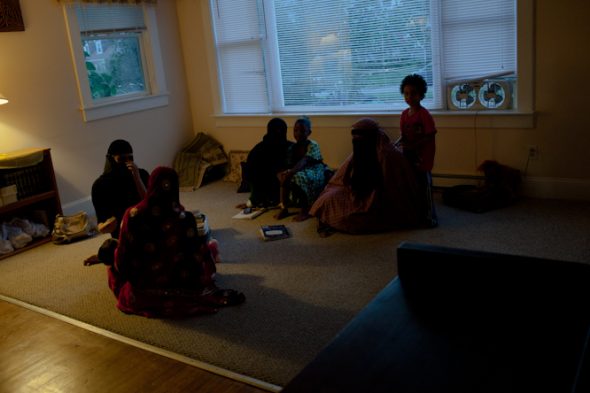
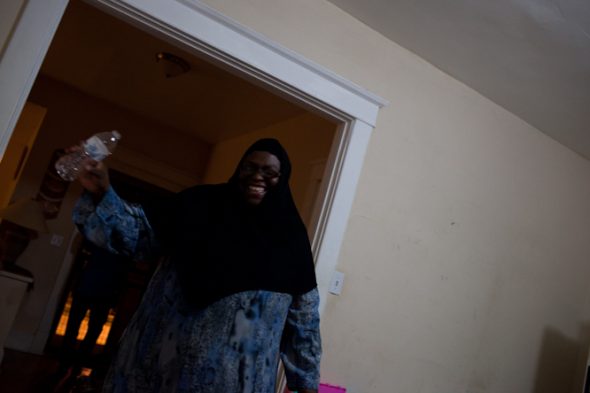
“This isn’t about religion,” said Jamila Gardner, a longtime volunteer here. “It’s a matter of men and their disrespect. The sad thing is, it doesn’t matter what religion these kind of men have. They have this attitude of ‘You’re mine, I can do with you whatever I want.’ When in reality, Islam has freed women and given them the same rights as her husband.”
My hand trembles as I scribble in my notepad these women’s stories. I’m reminded of all the abuse I learned about growing up regarding several women in my family. As Saima tells me her story, I can’t help but think about the time as a kid I pulled bloody shards of glass out the back of one relative after her husband pushed her through a table. Or the time one woman begged me to make her laugh because it was the only thing stopping her from crying about all the fiery red belt marks that streaked across her soft skin.
Reading this is a downer, sure. But our sentiments pale in comparison to the women going through it like Sara, who fell in love and married a longtime friend before her tale of romance was torn to shreds by his abusive behavior.
“It feels like a train hitting you,” Sara said. “How do you keep all of this pain inside of you when you’ve just gone through a train wreck? When he makes you feel like ‘You’re responsible for it, it’s your fault. Why did you talk back? Keep your mouth shut.’”
Sara sits next to Saima and comforts her throughout the conversation. She grew up in England and speaks with a dash of British elegance when she articulates her story. She said when she first dealt with her husband’s abuse, she initially went to her local mosque for help, but to no avail. The men there either shrugged off her problems or said they didn’t know how to help.
“I’ll put it to you straight,” she said. “You Muslim men, not all of you, but the ones who pretend to be the best Muslims, you are ignorant. You look at your own daughters and sisters in a different way. You would treat them in a different way than other women in your community. You all have daughters and you all have sisters and mothers. It’s your job to protect the Muslim women in your community and stand up for them.”
Asma Hanif is the executive director of the center. She said when the shelter first opened in 2007, it was tough to get the Muslim community to support it because they were in denial the problem existed to begin with. Then came the case in 2009 when Aasiya Zubair was gruesomely beheaded by her husband
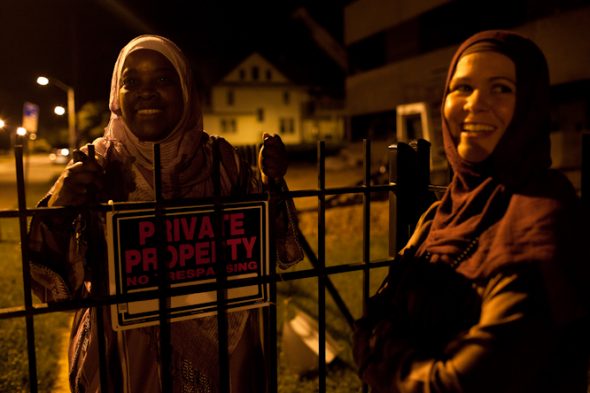
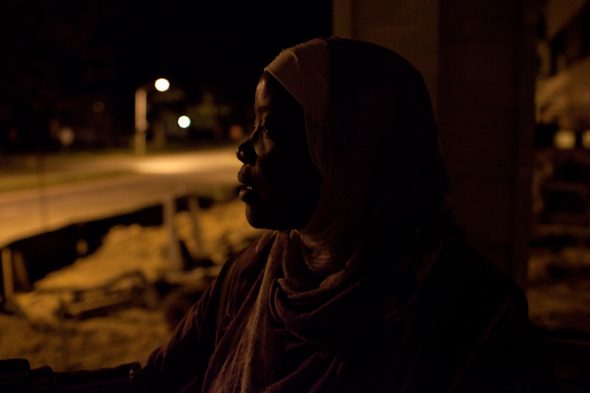
“It wasn’t until Aasiyah was beheaded, when the community said ‘Ok, we need to talk about domestic violence.’ This wasn’t something they could hide anymore.”
A few scholars in the Muslim community including Imam Zaid Shakir urged people to support An-Nisaa. But the shelter is still in dire need of support. Oftentimes, the shelter struggles to even cover its electric bill for the month.
“If somebody beheading their wife didn’t mobilize the community to do something about this, God, what would?” she said shaking her head before she paused. “…I can’t even answer that question.”
Asma is just as tenacious with her jokes as she is with her intolerance for apathy on this subject. After dealing with maddening case after case of abuse at the shelter, I asked her how she copes with the frustration.
“ I’m crazy, don’t you know that?” she quipped while rattling a backscratcher at me. “I’m like straight up Looney Tunes. I wear purple every day, come on. I’m straight up crazy, can’t you tell?”
“I tell people I cry every day,” she said while composing herself. “I meet these women and I hear all their sadness and sorrow playing in my head. Then I go into the community asking for help and all I hear is “No.”
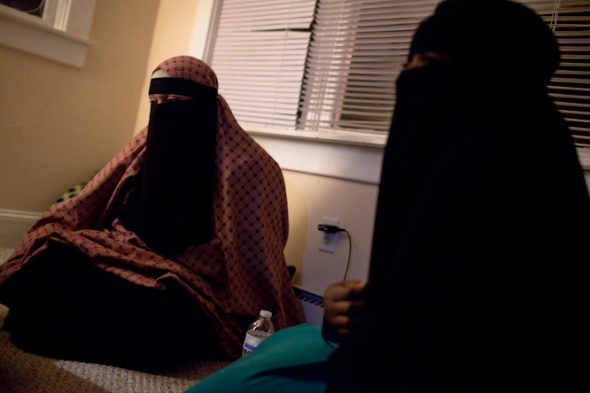
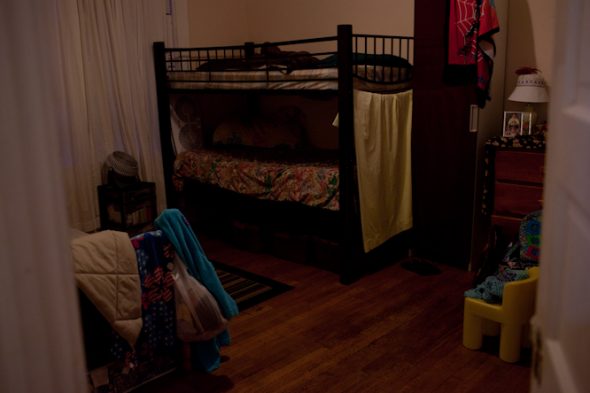
After dinner, I joined two women studying a few verses of Quran. One of them was Tahira, who was born Muslim but adopted by Christian parents. For years she dealt with verbal abuse from them and battled depression as a result. She even tried to commit suicide several times.
“My mother would yell at me all the time and tell me I was fat,” she said. “She would say my adopted parents gave me up because nobody wanted me. I knew that wasn’t the truth but it would still have an effect on me year after year.”
Sara told me in many cases, verbal abuse is just as bad as physical abuse, if not greater.
“Physical abuse is going to go away,” she said. “You’re going to heal and you’ll get better. But those emotional scars, those don’t go away. The verbal abuse, the anxiety you’re put through that leads to depression… that’s not something that’s easily swallowed.”
Tahira then discovered her Muslim roots and researched the religion before embracing Islam in April this year. Her family wanted no part of that and she’s now in the shelter as a safe haven.
“I’ve been a practicing Muslim for about four months,” she said. “I have a long way to go before I can open up my arms to them and say “Ok, I understand.” I still have a process to go through because emotionally I’m not ready.”
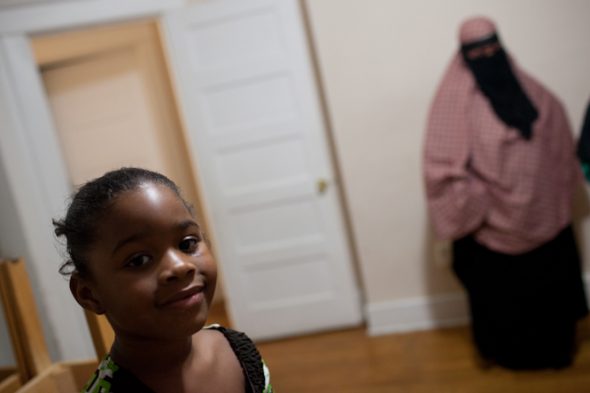
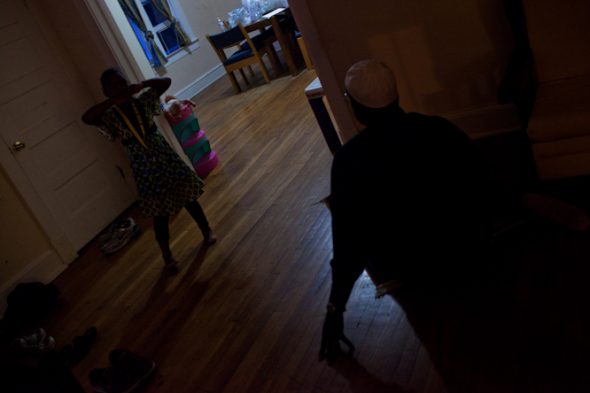
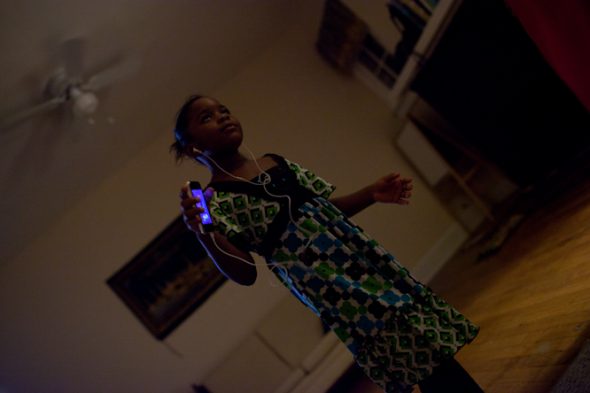
Considering her adopted parents abused her, I asked her if she ever wondered why they would even adopt her to begin with.
“Oh yeah, almost every day,” she said. “But there’s a reason for everything. This was Allah’s way of bringing me back to Islam and put me here in this town where there are a lot of good people here. It was Allah’s way of saying ‘I’m ready for you and have something in store for you.’”
The woman next to her, Amy, nodded in agreement. Amy dealt with several years of abuse from her husband as they raised children together. Both of them embraced Islam after getting married but things didn’t change.
“Embracing Islam together, I thought things would get better,” she said. “But he just didn’t want to practice.”
Amy’s son interrupts our conversation by walking up to me and rubbing my head.
“Mom, he’s bald!” he said with a giggle.
“I see you got jokes,” I retorted back. “I’ll tell you what, give me like 10 minutes more to talk to your mom and I’ll play a game with you where you can rub my head all you want. Deal?”
“Deal,” he said while shaking my hand.
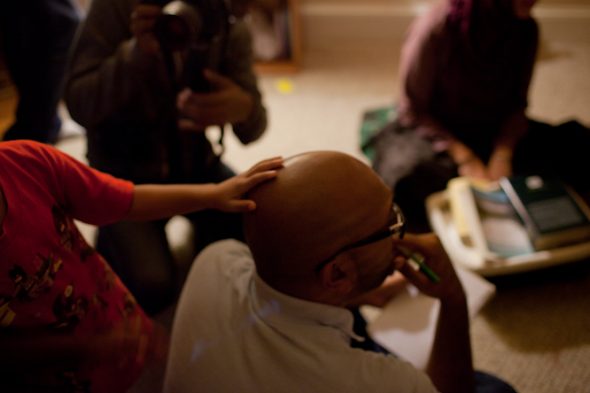
Amy said she left her husband because he wanted her to stop practicing Islam. And that’s when enough was enough. Like Tahira, she too sees her struggle as divine plans for bigger and brighter things in her future.
“It was Allah’s plan” she said. “Everything happens for a reason. There’s a reason why I met my husband. If I would have never been with him, I would have never found Islam. It might have been a bad situation, but at the same time, it produced something beautiful.”
These stories are moving, but there’s a good chance in about five to ten minutes we’ll forget about them. Don’t. You probably know at least one person in your life dealing with abuse. Do everything you can to help them. If you think it’s a damn shame nobody is supporting this Muslim women’s shelter, put your money where your mouth is.
But whatever you do, don’t feel pity for these women. That’s not what they’re looking for. Pray for them. And pray that God gives you the same amount of strength and courage he gave them to deal with this.
